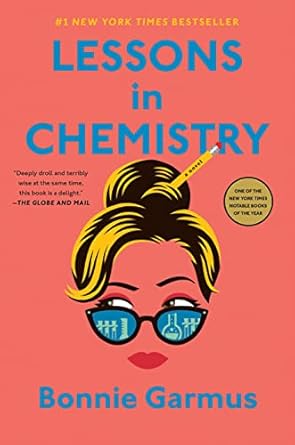3.5 Stars
This is a much-hyped, sometimes-comic novel that examines the social strictures imposed on women in the mid-20th century and pleads for gender equality.
The novel opens in California in 1961. Elizabeth Zott is a single mother and reluctant host of an afternoon cooking show for housewives. By training, she is a research chemist, but her academic career was derailed despite her obvious intelligence; flashbacks reveal why she didn’t pursue her PhD, why she was fired from a research institute, and how she finds herself a television celebrity giving cooking lessons while also teaching chemistry and encouraging female empowerment.
Elizabeth reminded me of other neuro-divergent characters I’ve encountered in books recently: Molly Gray from The Maid and Eleanor Oliphant from Gail Honeyman’s novel. She is awkward in social situations; she comes across as abrasive because she is immune to social conventions and insists on speaking her mind. She is ultra-focused and so stubborn that compromise is never an option for her. Her intelligence and self-assuredness often irritate people, as do many of her non-conformist opinions which identify her as an atheist and feminist, a woman ahead of her time.
Men do not fare well. So many of them are chauvinists, sexists, liars, plagiarists, manipulators, and even rapists. They have no redeeming qualities so they become almost creepy cartoon villains. There are some good guys like Calvin Evans and Walter Pine but both demonstrate some arrogance in their lack of understanding of women and how they are perceived and treated by society. Though I understand the book’s message, I’d prefer a little less male-bashing.
Another character that annoyed me is Six-Thirty. The anthropomorphizing of the dog seems unnecessary and doesn’t fit the rest of the novel. I know he’s intended to be quirky and charming, much like Elizabeth, but I found him grating after a while. What’s his purpose? To prove that Elizabeth is correct in her assessment of his intelligence? To add humour?
On the topic of humour, I should admit that, though I Iove stand-up comedy, I’m not a fan of comic fiction. In this particular novel, it’s the hyperbole that I know is intended for comic purposes that irked me. Characters are exaggerated for effect: Madeline is not just precocious but super precocious, and the dog not only has a massive vocabulary but makes a heroic save. A woman doesn’t just complete premed studies but does so in record time and is immediately accepted into medical school. Elizabeth herself is an outsized character because she’s not just gifted but also attractive, and she excels at all she does: chemistry, food science, and rowing. She even becomes a superstar of sorts because of her television show.
Other exaggerations are also unbelievable. A pregnant scientist doesn’t see a doctor about her pregnancy until almost ready to deliver? Who uses scientific terms for ingredients in a recipe? A kitchen is converted into a lab? Hyperbole makes parts of the books absurd, and I am not a fan of absurdist humour. I prefer more subtle humour like Elizabeth’s answering Mr. Donatti’s question (“’A woman telling me what pregnancy is. Who do you think you are?’”) by simply stating, “’A woman.’” Or Calvin’s thoughts about the designers of bridesmaids’ dresses: “He thought about the people who designed these dresses; how, like bomb manufacturers or pornography stars, they had to remain vague about the way they made their livings.”
The book also relies too much on coincidence. As soon as Madeline meets a minister in the library, I knew who he would be. Of course his secretary would be Miss Frask. And of course there’s the deus ex machina ending where a rich female benefactor, a very specific woman, helps Elizabeth get her revenge. The result is a fairy tale ending, one gift-wrapped and tied with a bow for good measure.
The book jacket describes the book as “laugh-out-loud funny,” but it touches on many serious topics: suicide, homosexuality, domestic abuse, sexual harassment, rape, grief, misogyny, double standards for men and women, religion, unwed mothers, parenting, lack of career opportunities for women, etc. Sometimes the message about women’s rights and social issues is delivered in a heavy-handed fashion. Elizabeth delivers some monologues that had me thinking there should be a soundtrack of Helen Reddy or Emmy Meli singing their “I am Woman” songs.
The book has a positive message about female empowerment and it is an easy, entertaining read. Because of its many rave reviews, I was expecting more, so I guess I’m in the minority. For me, it was a good summer read.

No comments:
Post a Comment